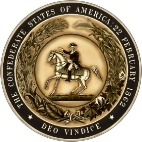
The birth of the Confederate States of America (CSA) was marked by a momentous day in history—February 8, 1861.On this date, representatives from seven Southern states gathered in Montgomery, Alabama, to forge a new nation. With the signing of the Provisional Constitution, they declared their independence from the United States of America and set forth on a path that would leave an indelible mark on history.
As we revive the legacy of the Confederate States through the resurrection of csagov.org, let us reflect on the founding day, the principles that guided its creation, and the vision of those who sought to shape the Confederacy.
The Seeds of Secession
The Southern states’ decision to secede was rooted in their desire to preserve their sovereignty, defend their economic way of life, and uphold their interpretation of states’ rights. Following the election of Abraham Lincoln in 1860, tensions reached a boiling point. Southern leaders felt their voices were no longer heard in the Union and believed that forming a separate government was the only solution.
Montgomery: The Birthplace of the Confederacy
On February 4, 1861, delegates from South Carolina, Mississippi, Florida, Alabama, Georgia, Louisiana, and Texas convened in Montgomery, Alabama. Over the next four days, they worked tirelessly to craft the framework of their new nation.
By February 8, the Provisional Constitution was adopted, establishing the Confederate States of America. This document provided the legal foundation for the Confederacy, emphasizing a decentralized government that prioritized the rights of individual states.
Montgomery was chosen as the first capital of the Confederacy, and its streets buzzed with anticipation and pride. The city became the cradle of a nation that sought to chart its own destiny.
The Delegates Who Shaped the Confederacy
The signing of the Provisional Constitution was made possible by the work of dedicated representatives from the seven Southern states that first seceded. Let’s take a closer look at the individuals who played a pivotal role in the founding of the Confederacy:
South Carolina
- Robert Barnwell Rhett: Known as the “Father of Secession,” Rhett was one of the leading voices advocating for the independence of Southern states. A staunch defender of states’ rights, he played a significant role in South Carolina’s decision to secede.
- C. G. Memminger: An experienced legislator and financial expert, Memminger later became the Secretary of the Treasury for the Confederate States.
Mississippi
- William S. Barry: Barry was a former Speaker of the Mississippi House of Representatives and a fervent supporter of secession. His leadership was instrumental in pushing Mississippi toward independence.
- Walker Brooke: A prominent lawyer and politician, Brooke brought a wealth of legal knowledge to the drafting of the Provisional Constitution.
Florida
- Jackson Morton: Morton was a staunch advocate for the Confederacy and played a key role in Florida’s decision to join the new nation.
- James B. Owens: Owens represented Florida’s interests and helped shape the Confederate government during its formative days.
Alabama
- William L. Yancey: A fiery orator and prominent advocate of secession, Yancey was a leading figure in Alabama’s movement to join the Confederacy.
- Thomas Fearn: Fearn contributed his political experience to the drafting of the Confederacy’s foundational documents.
Georgia
- Robert Toombs: Toombs was one of the most prominent leaders of the secession movement. A skilled orator, he later served as the Confederate Secretary of State.
- Howell Cobb: A former Speaker of the U.S. House of Representatives, Cobb presided over the Provisional Congress and played a crucial role in drafting the Confederate Constitution.
Louisiana
- John Perkins Jr.: Perkins was a plantation owner and politician who championed Louisiana’s secession and the Confederacy’s formation.
- Alexander Mouton: Mouton, a former governor of Louisiana, lent his political influence to the secessionist cause.
Texas
- John Hemphill: Known as the “Father of Texas Jurisprudence,” Hemphill was a former Chief Justice of the Texas Supreme Court and a strong proponent of secession.
- Louis T. Wigfall: Wigfall, a fiery and outspoken advocate for Southern independence, later became a Confederate senator.
Jefferson Davis: The First and Only President
On February 9, 1861, Jefferson Davis was elected as the provisional president of the Confederate States. A West Point graduate and seasoned politician, Davis was seen as the ideal leader to navigate the Confederacy through its nascent stages.

In his inaugural address, Davis spoke of the Confederacy’s commitment to liberty, independence, and self-governance. His words echoed the aspirations of the Southern people and set the tone for the new government.
Celebrating the Spirit of the Confederacy
The founding day of the Confederate States represents more than just a historical event—it symbolizes the determination of a people to fight for what they believed was their right to self-determination. While the Confederacy was short-lived, its founding serves as a powerful reminder of the complexities of American history and the enduring struggle over the balance of power between states and the federal government.
Through the resurrection of csagov.org, we aim to honor this chapter of history with thoughtful discussion, accurate representation, and educational resources. The goal is not to divide but to explore the intricacies of the past, learning from it and fostering a deeper understanding of the events that shaped our nation.
Looking to the Future
The Confederate States of America may have existed for only four years, but its founding day remains a significant moment in history. It is a day to reflect on the courage, convictions, and complexities of those who dared to create a new path.
As we breathe new life into the legacy of the Confederacy through this platform, we invite you to join us on this journey of rediscovery. Together, let us examine history with fresh eyes, engage in meaningful dialogue, and preserve the stories of the past for future generations.
Happy Founding Day to all who hold history close to their hearts!
Read more on the US flag history.



More Stories
How to Embrace Southern Heritage as a Modern Confederate with Style
What is the Confederate States of America?
CSA Justice Department Mission